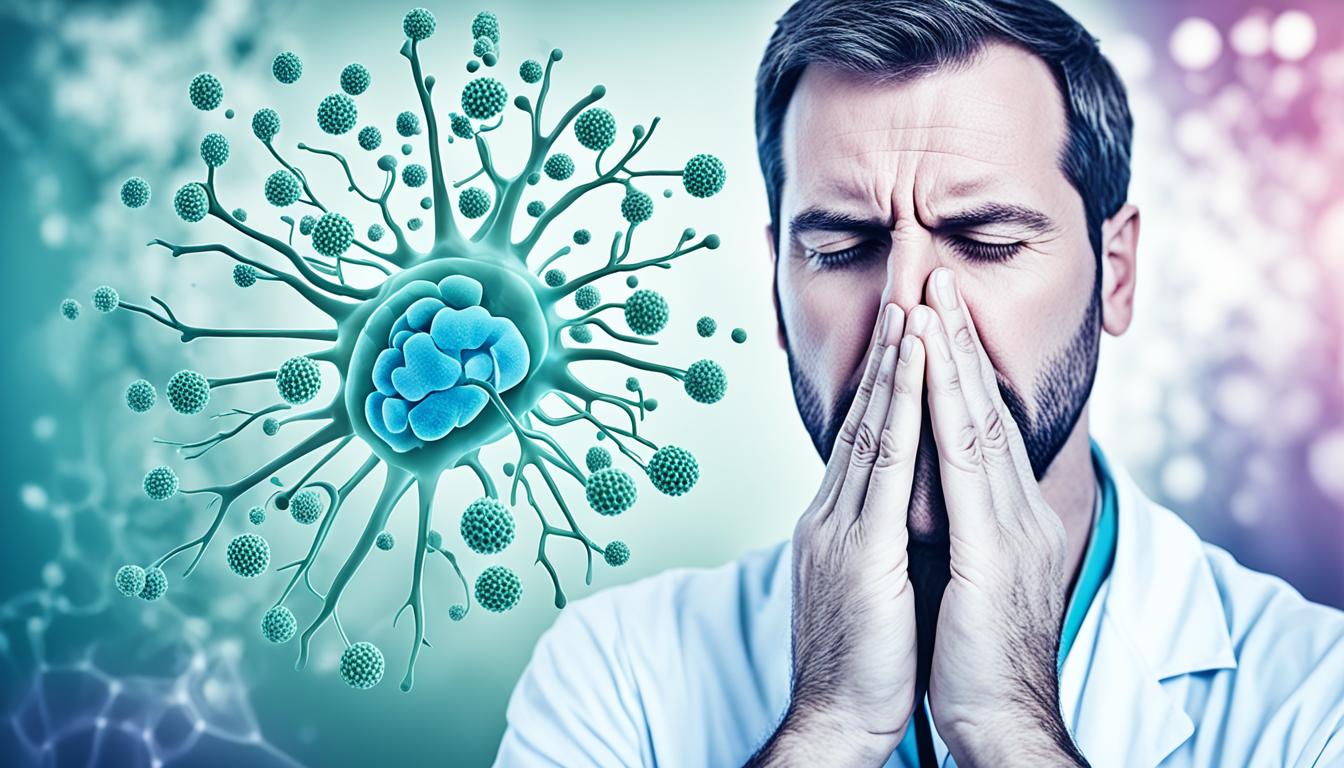Sick sinus syndrome (SSS) is a group of heart disorders. It’s caused by the sinus node not working well. The sinus node manages the heart’s rhythm. When it malfunctions, it leads to heart rhythm issues like slow or fast heart rates.
There are several types of SSS. This includes a heart rate that’s persistently slow, pauses in the heart’s activity, and more. These types can disrupt how the heart normally works. This impact can be severe on someone’s life.
Age plays a big role in SSS, especially in older people. Other factors include heart and thyroid diseases, sleep apnea, and issues with the coronary arteries. These factors mess with the heart’s electrical signals. They make it hard for the sinus node to keep the heart rate regulated.
The signs of SSS differ based on its kind and how serious it is. Some common signs are fainting, tiredness, dizziness, and feeling your heart beat too fast. You might also have a slow heartbeat, trouble breathing, chest pain, and memory lapses. These signs really affect your daily life and health.
To diagnose SSS, doctors run several tests on your heart’s electrical activity. These tests include an ECG, echocardiogram, and Holter monitoring for a day. They look for any irregular heartbeats. This helps determine the best way to treat the issue.
Treating SSS aims to reduce signs, better the heart’s work, and stop problems. At first, doctors might give you medicine to control your heart rate. If that doesn’t work, getting a pacemaker is often the best choice. A pacemaker helps control your heart’s rhythm by sending small electric signals to it.
Key Takeaways:
- Sick sinus syndrome (SSS) is a group of heart issues tied to the sinus node’s malfunction.
- Signs of SSS include fainting, tiredness, feeling your heart beat irregularly, and more.
- Doctors check your heart’s electrical activity through tests like ECG, echo, and Holter monitors.
- For SSS, treatment options are medicine for symptom relief or a pacemaker for more severe cases.
- Researchers are looking into stem cell therapy and biological pacemakers for new treatment options.
Pacemaker Implantation and Drug Treatment for Sick Sinus Syndrome
Sick Sinus Syndrome (SSS) can be treated with drugs or by putting in a pacemaker. A pacemaker is often better for patients who need it to manage their heart’s rhythm. This is especially true if their heart’s natural pacemaker, the sinus node, is not working well.
Medicines aim to make the symptoms of SSS better. There are drugs to make the heart beat faster or help avoid certain heart rhythm problems. But, the best medicine for SSS is not the same for everyone. It depends on what’s wrong with the patient’s heart and how bad their symptoms are.
A pacemaker, however, is a durable fix for SSS. It keeps the heart’s beat steady by sending electrical signals. Even if the sinus node doesn’t work, the pacemaker makes sure the heart keeps a regular rhythm.
Doctors choose between one or two leads based on what the patient needs. They decide this after carefully checking the patient’s heart’s electrical signals. Both kinds of pacemakers help the heart beat normally again.
Limitations and Potential Complications of Pacemaker Implantation
Pacemaker implantation is a good way to treat SSS, but it has downsides. Leads can move out of place, causing the pacemaker not to work right. Fixing this might mean another surgery to move the leads back.
Getting an infection at the spot where the pacemaker was put in is another risk. It happens when germs are brought into the body during the procedure. The patient needs to see a doctor right away if the area around the pacemaker looks infected.
Some patients might have bleeding after getting a pacemaker, even though it’s rare. This is more likely in patients who take blood-thinners or have blood clotting problems. Doctors must watch them closely to catch and treat any bleeding early.
Pacemakers can also face problems with strong electrical fields. These come from things like MRI machines and heavy-duty electrical tools. Patients with pacemakers need to avoid these things to keep their pacemakers working well.
After getting a pacemaker, it’s vital to know about these issues. Following the doctor’s directions on care and check-ups will help keep things running smoothly.
Advanced Treatments and Outlook for Sick Sinus Syndrome
Drug therapy and pacemaker implantation remain key treatments for Sick Sinus Syndrome (SSS). But, research works on advanced treatment options. Stem cell therapy and biological pacemakers show promise for managing SSS in the future.
Stem cell therapy uses the regenerative properties of stem cells. They can turn into specialized heart tissue. This includes the sinus node, offering a natural pacemaker to those with SSS. This new method is promising.
Biological pacemakers are also under research. Scientists aim to create pacemakers with gene and cell therapies. These could work like a healthy sinus node, improving the heart’s rhythm and function.
Advancements in pacemakers technology have improved SSS treatment. By replacing the missing electrical signals, modern pacemakers help manage symptoms better. A better life quality is possible with these. Still, without treatment, SSS can cause irregular heartbeats and increase the risk of cardiac arrest.
Regular check-ups and the right treatments are key to managing SSS and getting better over time.

